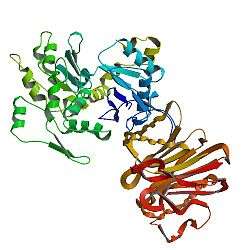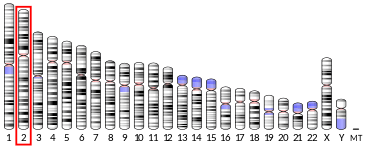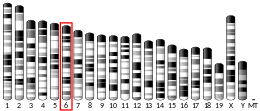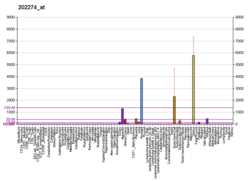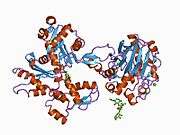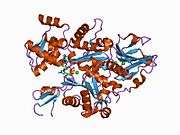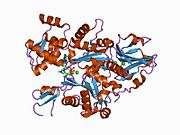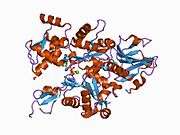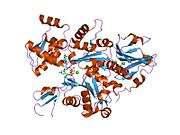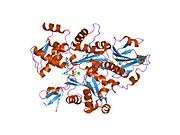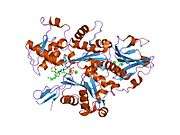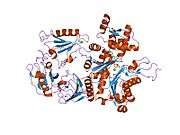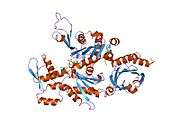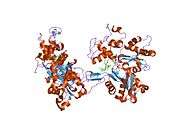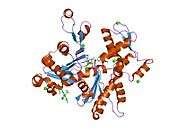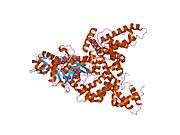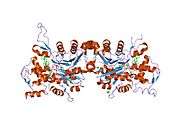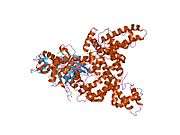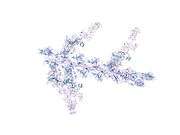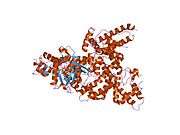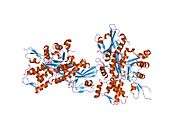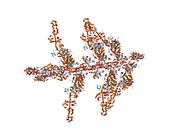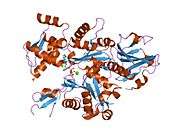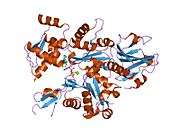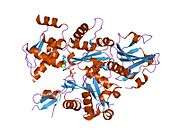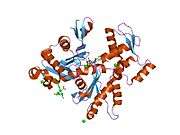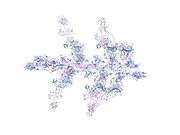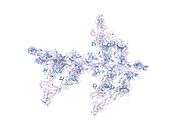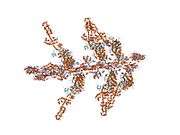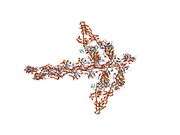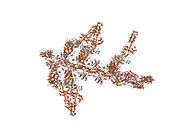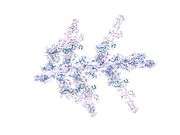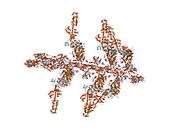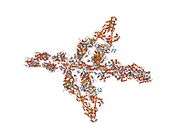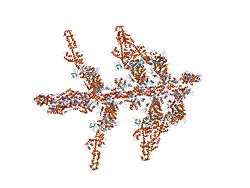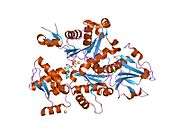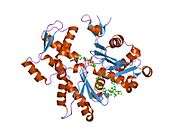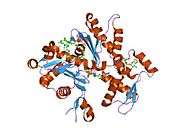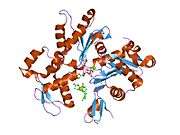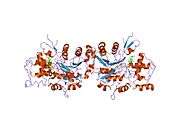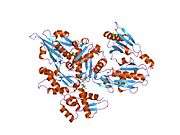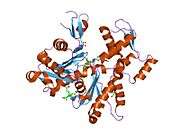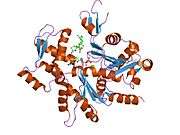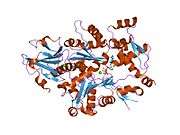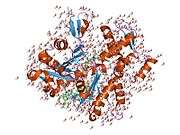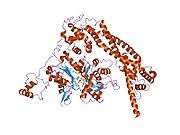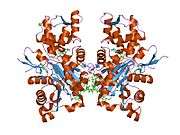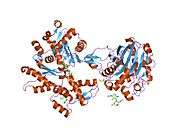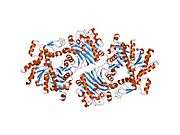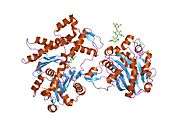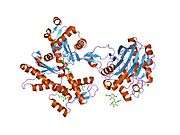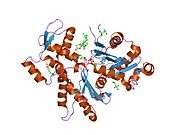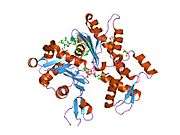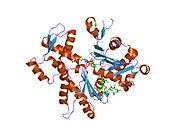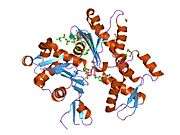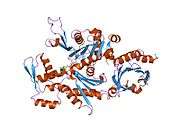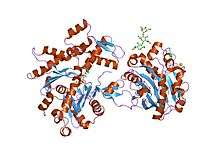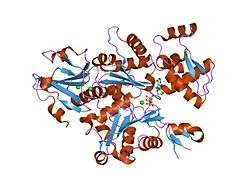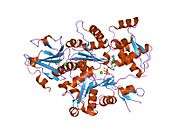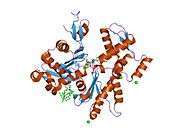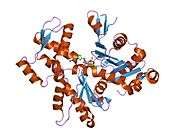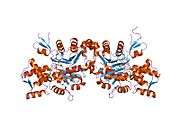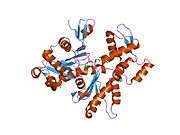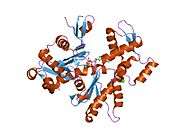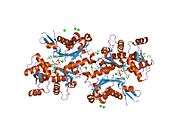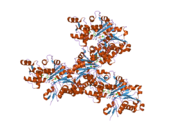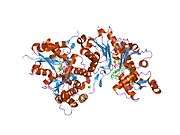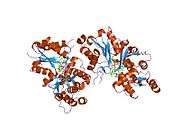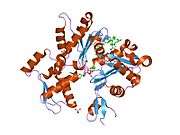ACTG2
Actin, gamma-enteric smooth muscle is a protein that in humans is encoded by the ACTG2 gene.[5][6][7]
Actins are highly conserved proteins that are involved in various types of cell motility, and maintenance of the cytoskeleton. In vertebrates, three main groups of actin isoforms, alpha, beta and gamma have been identified. The alpha actins are found in muscle tissues and are a major constituent of the contractile apparatus. The beta and gamma actins co-exist in most cell types as components of the cytoskeleton, and as mediators of internal cell motility. Actin, gamma 2, encoded by this gene, is a smooth muscle actin found in enteric tissues.[7]
Interactions
ACTG2 has been shown to interact with Emerin.[8]
gollark: You should use RPNCalc's x86 target.
gollark: Æ writing this application to be better is hard.
gollark: > if one is going to be an overlord it's important to be regarded as an evil overlord because then when you want to enact policy that has immediate costs and long-term benefits, instead of having to tediously, endlessly justify why it's good you can just be like "[REDACTED] you i'm evil"Does this explain LyricLy?
gollark: Unfortunately discord message limits prevent that.
gollark: x86-RPNCalc has string-printing capability.
References
- GRCh38: Ensembl release 89: ENSG00000163017 - Ensembl, May 2017
- GRCm38: Ensembl release 89: ENSMUSG00000059430 - Ensembl, May 2017
- "Human PubMed Reference:". National Center for Biotechnology Information, U.S. National Library of Medicine.
- "Mouse PubMed Reference:". National Center for Biotechnology Information, U.S. National Library of Medicine.
- Miwa T, Manabe Y, Kurokawa K, Kamada S, Kanda N, Bruns G, Ueyama H, Kakunaga T (July 1991). "Structure, chromosome location, and expression of the human smooth muscle (enteric type) gamma-actin gene: evolution of six human actin genes". Mol Cell Biol. 11 (6): 3296–306. doi:10.1128/mcb.11.6.3296. PMC 360182. PMID 1710027.
- Ueyama H (May 1991). "A HindIII DNA polymorphism in the human enteric type smooth muscle actin gene (ACTSG)". Nucleic Acids Res. 19 (2): 411. doi:10.1093/nar/19.2.411. PMC 333620. PMID 1673027.
- "Entrez Gene: ACTG2 actin, gamma 2, smooth muscle, enteric".
- Lattanzi, Giovanna; Cenni Vittoria; Marmiroli Sandra; Capanni Cristina; Mattioli Elisabetta; Merlini Luciano; Squarzoni Stefano; Maraldi Nadir Mario (April 2003). "Association of emerin with nuclear and cytoplasmic actin is regulated in differentiating myoblasts". Biochem. Biophys. Res. Commun. United States. 303 (3): 764–70. doi:10.1016/S0006-291X(03)00415-7. ISSN 0006-291X. PMID 12670476.
External links
- Human ACTG2 genome location and ACTG2 gene details page in the UCSC Genome Browser.
Further reading
- Snásel J, Pichová I (1997). "The cleavage of host cell proteins by HIV-1 protease". Folia Biol. (Praha). 42 (5): 227–30. doi:10.1007/BF02818986. PMID 8997639.
- Adams LD, Tomasselli AG, Robbins P, et al. (1992). "HIV-1 protease cleaves actin during acute infection of human T-lymphocytes". AIDS Res. Hum. Retroviruses. 8 (2): 291–5. doi:10.1089/aid.1992.8.291. PMID 1540415.
- Tomasselli AG, Hui JO, Adams L, et al. (1991). "Actin, troponin C, Alzheimer amyloid precursor protein and pro-interleukin 1 beta as substrates of the protease from human immunodeficiency virus". J. Biol. Chem. 266 (22): 14548–53. PMID 1907279.
- Shoeman RL, Kesselmier C, Mothes E, et al. (1991). "Non-viral cellular substrates for human immunodeficiency virus type 1 protease". FEBS Lett. 278 (2): 199–203. doi:10.1016/0014-5793(91)80116-K. PMID 1991513.
- Miwa T, Kamada S (1990). "The nucleotide sequence of a human smooth muscle (enteric type) gamma-actin cDNA". Nucleic Acids Res. 18 (14): 4263. doi:10.1093/nar/18.14.4263. PMC 331204. PMID 2377475.
- Ueyama H, Inazawa J, Nishino H, et al. (1995). "Chromosomal mapping of the human smooth muscle actin gene (enteric type, ACTA3) to 2p13.1 and molecular nature of the hindIII polymorphism". Genomics. 25 (3): 720–3. doi:10.1016/0888-7543(95)80016-F. PMID 7759108.
- Szucsik JC, Lessard JL (1996). "Cloning and sequence analysis of the mouse smooth muscle gamma-enteric actin gene". Genomics. 28 (2): 154–62. doi:10.1006/geno.1995.1126. PMID 8530021.
- Bukrinskaya A, Brichacek B, Mann A, Stevenson M (1999). "Establishment of a Functional Human Immunodeficiency Virus Type 1 (HIV-1) Reverse Transcription Complex Involves the Cytoskeleton". J. Exp. Med. 188 (11): 2113–25. doi:10.1084/jem.188.11.2113. PMC 2212381. PMID 9841925.
- Zhang H, Wang L, Kao S, et al. (1999). "Functional interaction between the cytoplasmic leucine-zipper domain of HIV-1 gp41 and p115-RhoGEF". Curr. Biol. 9 (21): 1271–4. doi:10.1016/S0960-9822(99)80511-9. PMC 4513661. PMID 10556093.
- Kohnen G, Campbell S, Jeffers MD, Cameron IT (2000). "Spatially regulated differentiation of endometrial vascular smooth muscle cells". Hum. Reprod. 15 (2): 284–92. doi:10.1093/humrep/15.2.284. PMID 10655297.
- Filmore RA, Dean DA, Zimmer WE (2003). "The smooth muscle gamma-actin gene is androgen responsive in prostate epithelia". Gene Expr. 10 (5–6): 201–11. doi:10.3727/000000002783992424. PMC 5977519. PMID 12450213.
- Strausberg RL, Feingold EA, Grouse LH, et al. (2003). "Generation and initial analysis of more than 15,000 full-length human and mouse cDNA sequences". Proc. Natl. Acad. Sci. U.S.A. 99 (26): 16899–903. Bibcode:2002PNAS...9916899M. doi:10.1073/pnas.242603899. PMC 139241. PMID 12477932.
- Cheng C, Sharp PA (2003). "RNA Polymerase II Accumulation in the Promoter-Proximal Region of the Dihydrofolate Reductase and γ-Actin Genes". Mol. Cell. Biol. 23 (6): 1961–7. doi:10.1128/MCB.23.6.1961-1967.2003. PMC 149466. PMID 12612070.
- Wu RF, Gu Y, Xu YC, et al. (2004). "Human Immunodeficiency Virus Type 1 Tat Regulates Endothelial Cell Actin Cytoskeletal Dynamics through PAK1 Activation and Oxidant Production". J. Virol. 78 (2): 779–89. doi:10.1128/JVI.78.2.779-789.2004. PMC 368750. PMID 14694110.
- Ota T, Suzuki Y, Nishikawa T, et al. (2004). "Complete sequencing and characterization of 21,243 full-length human cDNAs". Nat. Genet. 36 (1): 40–5. doi:10.1038/ng1285. PMID 14702039.
- Gerhard DS, Wagner L, Feingold EA, et al. (2004). "The Status, Quality, and Expansion of the NIH Full-Length cDNA Project: The Mammalian Gene Collection (MGC)". Genome Res. 14 (10B): 2121–7. doi:10.1101/gr.2596504. PMC 528928. PMID 15489334.
- Hillier LW, Graves TA, Fulton RS, et al. (2005). "Generation and annotation of the DNA sequences of human chromosomes 2 and 4". Nature. 434 (7034): 724–31. Bibcode:2005Natur.434..724H. doi:10.1038/nature03466. PMID 15815621.
This article is issued from Wikipedia. The text is licensed under Creative Commons - Attribution - Sharealike. Additional terms may apply for the media files.
